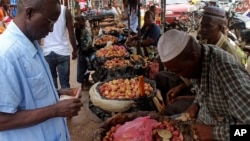Food prices have climbed by an average of 24 percent across the three countries worst hit by the Ebola outbreak, forcing some families to reduce their intake to one meal a day, a World Food Program spokeswoman said Friday.
The sobering news was offset somewhat by reports Friday that the outbreak has been contained in Senegal and that four people suspected of infection have tested negative in Spain.
The food-producing regions of Guinea, Sierra Leone and Liberia in West Africa have been severely affected by the worst outbreak on record of the virus has killed nearly 4,500 people.
Infection rates in the food-producing zones of Kenema and Kailahun in Sierra Leone, Lofa and Bong County in Liberia and GuDeckDedou in Guinea are among the highest in the region. Hundreds of farmers have died.
The three governments quarantined districts and restricted movements to contain the virus’ spread. But those measures also disrupted markets and led to food scarcity and panic buying, further pushing up prices, WFP and the Food and Agriculture Organization have said.
"Prices have risen by an average of 24 percent," said WFP spokeswoman Elisabeth Byrs, adding an assessment of major markets showed the price of basic commodities was rising in Guinea, Liberia and Sierra Leone and in neighboring Senegal.
Staple foods affected
In the Liberian capital Monrovia, prices of cassava and imported rice, the main staple food, have increased by 30 percent.
"Planting and harvesting [are] being disrupted," creating future problems, Byrs told Reuters. "There is a high risk that prices will continue to increase during the coming harvest season.''
Byrs said WFP was carrying out a food security survey remotely using mobile phones to investigate Ebola’s impact on 2,400 families across the three countries.
The first round of the survey of 800 people in Sierra Leone's eastern districts of Kailahun and Kenema showed people are worse off in terms of food security, despite being the main producing areas.
"The survey showed that certain families have cut down to one meal a day or that people are eating food that costs less, such as cassava instead of rice," she said.
Senegal’s response praised
Also Friday, the World Health Organization praised Senegal’s health officials for responding quickly after confirming Ebola in a young man August 29 after he’d arrived in Dakar from Guinea. He recovered and went home. Meanwhile, the government continued monitoring his contacts for twice the incubation period of 21 days, turning up no new infections.
Officials at the United Nations agency called Senegal’s outbreak “officially over” but said the country must remain vigilant given its close proximity to West African countries hardest hit by the epidemic.
Negative tests in Spain
Spain reported Friday that all four suspected Ebola cases hospitalized on Thursday, including a Nigerian passenger taken from an evacuated plane by police-escorted ambulance, have tested negative for the deadly disease. They will be tested within 72 hours to confirm the results, the government said.
The three other people were a priest who had recently been in Liberia, a man recently in Sierra Leone who tested positive for malaria and a person who traveled in the same ambulance as Teresa Romero, Spain's only known Ebola sufferer.
Spain is on high alert for the disease after Romero, a nurse who cared for two Ebola-infected priests before they died, became the first person to contract the virus outside West Africa. She is gravely ill but stable.





